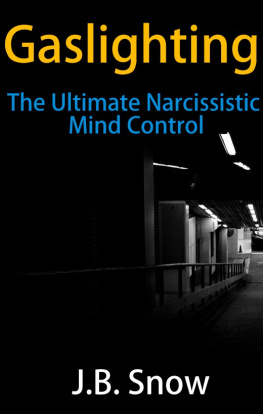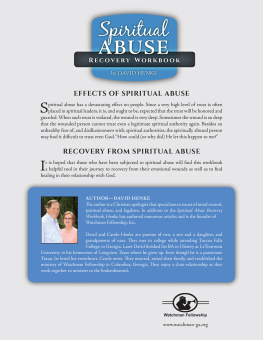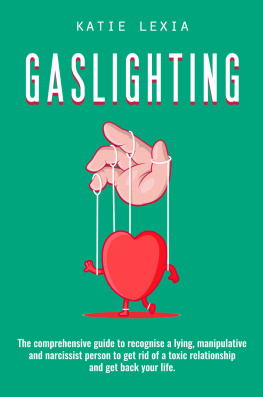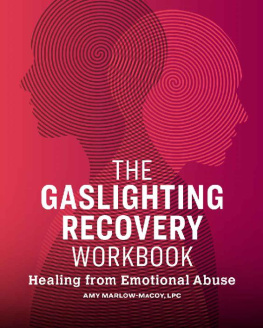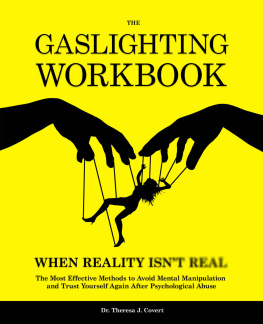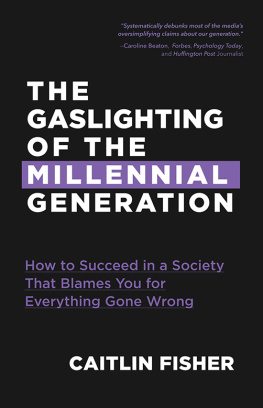GASLIGHTING
Overcoming Emotional and Spiritual Abuse by Letting Go of a Bad Relationship
The Gaslighting Recovery Workbook
G.S. Hansen
COPYRIGHT 2020 BY G.S. Hansen
ALL RIGHTS RESERVED
This document is geared toward providing exact and reliable information with regard to the topic and issue covered. The publication is sold with the idea that the publisher is not required to render accounting, officially permitted, or otherwise qualified services. If advice is necessary, legal or professional, a practiced individual in the profession should be ordered.
From a Declaration of Principles which were accepted and approved equally by a Committee of the American Bar Association and a Committee of Publishers and Associations.
In no way is it legal to reproduce, duplicate, or transmit any part of this document in either electronic means or in printed format. Recording of this publication is strictly prohibited, and any storage of this document is not allowed unless with written permission from the publisher. All rights reserved.
The information provided herein is stated to be truthful and consistent, in that any liability, in terms of inattention or otherwise, by any usage or abuse of any policies, processes, or directions contained within is the solitary and utter responsibility of the recipient reader. Under no circumstances will any legal responsibility or blame be held against the publisher for any reparation, damages, or monetary loss due to the information herein, either directly or indirectly.
The presentation of the information is without a contract or any type of guarantee assurance. The trademarks that are used are without any consent, and the publication of the trademarks is without the permission or backing of the trademark owners. All trademarks and brands within this book are for clarifying purposes only and are owned by the owners themselves, not affiliated with this document.
Table of Contents
CHAPTER ONE:
Understanding Gaslighting
CHAPTER TWO:
Warning signs of Gaslighting
CHAPTER THREE:
Understanding Narcissist
CHAPTER FOUR:
Types of Narcissists
CHAPTER FIVE:
Narcissists at Work: Toxic and Unproductive Environments
CHAPTER SIX:
Narcissism in relationships: what can we do?
CHAPTER SEVEN:
Empathy and Narcissism: Why are empathic people attracted to narcissistic partners?
CHAPTER EIGHT:
The Faces of Narcissism
CHAPTER NINE:
Emotional and psychological abuse
CHAPTER TEN:
Emotional Blackmail
CHAPTER ELEVEN:
What traits define a psychopath?
CHAPTER TWELVE:
Why toxic relationships affect you
CHAPTER THIRTEEN:
How is manipulation present in everyday life?
INTRODUCTION
T he word "gaslighting" derives from American film director George Cukor's 1944 film titled "Gaslight," starring Ingrid Bergman and Charles Boyer. The film takes place in Victorian England, where a gentleman persuades his young wife to stay in the old house where he grew up. And with a diabolical psychological strategy, he changes the lights of the house's gas lamps, pushing his wife to the brink of madness. It was in this same house that the man assassinated his aunt.
Therefore, the word gaslighting is used to describe a cruel, deceptive activity put in place by an abuser to make their target doubt themselves and their real-life decisions, start to feel confused, and think theyre going crazy.
The gaslighter, that is, the person who performs this mental manipulation, makes the victim believe that they are living in a reality that does not correspond to the objective reality, makes them feel wrong, and undermines all their certainty and safety, acts on real brainwashing of them in essence. Research shows that the victim and the gaslighter are relatively close in the vast majority of cases, almost always associates or close relatives.
The Gaslighting is a cruel technique of psychological coercion in which the perpetrator questions the validity of the beliefs of the victim until they are absolutely unaware of their own reality, in order to gain absolute control over their victim.
It is considered a strong psychological abuse perpetrated to generate suspicions in the other's mind, serving as true brainwashing.
Although it appears to be a very sophisticated and difficult technique to implement, it is more widespread than expected, particularly in partnerships or close relatives. We'll go into the first case in this post, that is, the relationship.
This kind of mental abuse is subtle, veiled, and operates on very deep emotional levels, which is why the victim themselves also defend it. The mental abuser has the power to cancel the verdict of the victim slowly.
The victim will initially be puzzled, realize something is wrong, and attempt to speak to their abuser about it. The abuser will refute everything the person has said and will make them (the victim) think they (the abuser) are right. Gradually the victim loses control and starts to doubt their thinking.
CHAPTER ONE:
Understanding Gaslighting
G aslighting is a metaphorical term referring to emotional violence in a deceptive manner. Perhaps the abuser would give false facts to their victims so that they can understand them better. The abuser's goal is to make their victims doubt their own health and memory about a given circumstance. We do not look at the victim as having done anything wrong in any way.
Gaslighting is usually committed by psychopaths, who are individuals with a personality disorder marked by a lack of empathy toward others and increased antisocial behavior. Such personality traits enable the abuse of other people by psychopaths without feeling guilty or embarrassed about it. Regular people who seek gas light would probably be unconvincing about it because it will give away their body language and facial expressions. Yet they can be very persuasive liars and manipulators like psychopaths, without giving away any indication of what they are doing to their victims. Their aim is to undermine the understanding of truth by their target, by making the lies seem true.
The word "gaslighting" was first applied with the stage play "Gas Light" in the late 1930s. This was a British play that introduced the term gaslighting to the general public. We discussed how it meant psychological abuse in the form of providing victims with false information so they would doubt their own memory and understanding.
Finally, the Gas Light play moved to the United States under the name Angel Road. Two film adaptations to the play occurred in the early 1940s. In 1940, there was a British movie entitled "Gaslight," and in 1944, an American movie entitled "Gaslight." Both movies involved an abuser carrying out systematic psychological manipulation on his victim.
The abuser is a husband who, gas-lighting her, makes a victim out of his wife. He basically tries to convince her and others that she's insane. He does this by manipulating different elements in their environment, and then insisting that his wife is wrong when she tries to remember the original way the elements were.
The term "gaslighting" comes from a scene in the story where the husband uses gas lights to search his house's attic for hidden treasure. If he does this, the gas lights continue to go dim in the remaining part of the room. His wife notices the dim lights and confronts her husband about it, but he denies it was ever. Psychologists and laypeople have been using gaslighting since the play and films came out to describe this type of psychopathic behavior.
Techniques of Gaslightin g
The person who uses this technique is typically a trusted person. It can happen in the family or between mates, but the most interest is in the couple where this trend has caught up.


